Daily Writing
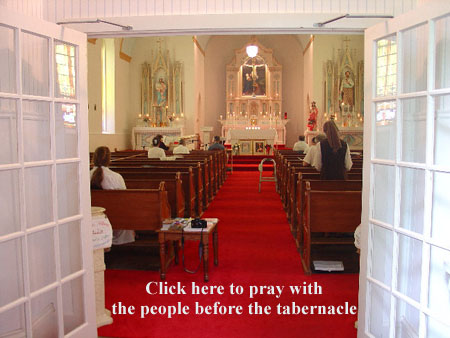
| Shepherds of Christ Daily Writing |
 |
March 22, 2008 - Holy Saturday
March 23rd Holy Spirit Novena
Scripture selection is Day 3 Period I.The Novena Rosary Mysteries
for March 23rd are Sorrowful.
Holy Saturday
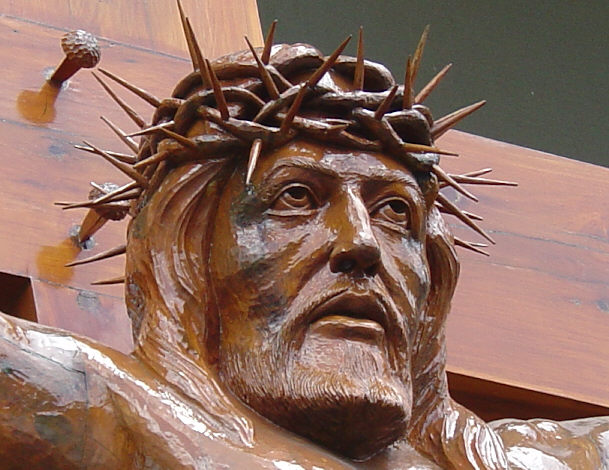
Focus Only on My Love (excerpt)
April 11, 1994 3:30a.m.
Jesus: ... Focus on the immensity of My love, child. I truly loved you to My death. Think how you feel when you are loved by a human. It is a feeling of peace and joy to know love. This is mere mortals giving imperfect love and you are given to such peace. I am God. I am Jesus Christ. I am Love. I am so full of love for you, perfect love, not the imperfect love of humans, but immense, longing, on-fire ardent love, love that never flickers, love that loves you in your darkest hour! Your whole answer to persecution is to know that you function only for love of Me and the immense burning love I have for you. I am God. I have all the power and I love you this way. Focus on being this loved. This sets you free. Your peace comes from these two facts.
Oh, how I love you, little ones! Think about Me, hanging there in such horrid agony, and in My mind are only thoughts of love for you. I am Jesus Christ. I am the living God. I am in your midst and I am loving you this way, this very day. You do not fret. You do not fear. You focus on My love coming-so immense you cannot comprehend-and it comes to you at every second. It never stops...
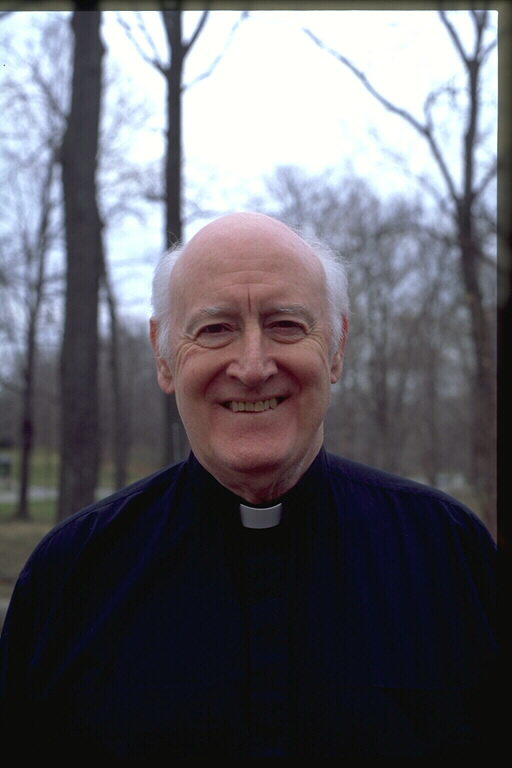
Fr. Carter's First Public Message April 2, 1994

From Tell My People
(Matthew 10:27)"What I say to you in the dark, tell in the day-
light; what you hear in whispers, proclaim
from the housetops."
Jesus: "This is the day celebrating My Resurrection (Easter). The day of newness of life. I am Lord and Master. I am the Way, the Truth, and the Life. Tell My people to come to Me if they wish to experience life in abundance. I want to give all an ever greater share in the life of My Resurrection. Without Me you cannot be happy, nor have peace, nor have real joy. Tell My people to surrender to Me more and more. The more they do so, the more they will experience My love, wisdom, power, peace, joy, happiness, mercy, and goodness. Within My Heart My people will find these riches. I am Lord and Master! Please listen to My words."
Reflection: Through His life, death, and resurrection, Jesus has come to give us life, and to give us this life in abundance.
When we were baptized, we were incorporated into Christ and His Church. When we were baptized, we received the life of sanctifying grace. This life is a created sharing in the life of the Trinity. Truly, we are called to live a God-like existence according to the teaching and example of Jesus! It is our duty and our privilege to develop our life of grace—our Christ-life—through our participation in the Mass, through the reception of the sacraments, through prayer, and through all other good works. Indeed, we are called to love God and neighbor more and more.
What a glorious life has been given to us! In a spirit of thanksgiving, and together with Mary our Mother, let us always strive to know Christ more intimately, to love Him more ardently, and to follow Him more closely, so that He will always bring us to a closer union with the Father in the unity of the Holy Spirit.

I Love You-You Love Your Brothers

April 3, 1994 Easter Sunday
Jesus: My child, calm yourself. Live only for love of Me. Live for Me and Me alone. You love Me and I love you. Your love for others will flow from your love for Me. I sustain you. I give you everything you need. Your life is but a breath here. Do not ever focus on it. Remain selfless. Rid yourself constantly of self and operate only to know, love and serve Me.
I am Jesus, the Son of God. Oh, little one, such love I have for you. Do you even know? This is not a myth. This is real. I am real. The unseen world is real. It is your faith that will sustain you. I am Jesus, the Son of God, Rita. God is talking to you. You have a job to do for all My beloved ones. I love them so. I want you to tell them of My deep and ardent love. Surrender yourself into the arms of Him Who sustains you. I catch you. I cuddle you and you, child are not suspended in mid-air. You are held tight by the hands of God. I showed you the way, child. I let go on the cross. Life comes only in this surrendering. I let go, I died that I might rise again on Easter! You die to yourself that you will live in My love. You will rise victorious in the love of Jesus. Oh, child, I am so real and I love you. What can I do to tell you how I do love you!
Live in My love. Do not judge. Do not spend idle time making yourself better than your brother. Think only of Me and how I love you. You have your job: (1) to love Me with all your heart and (2) to love your brother as yourself. Do not look on your brother with anything but love. How freeing! Love finds a way! Where hate keep you tied to yourselves, loving one and all frees you. Love Me. Love your brothers. They are responsible for their lives. You are responsible for your life.
Your job is to love. I call you, My little ones, to love of Me and love of one another. You will answer according to how you loved. You will not be judged on the amount of money you made, on your worldly possessions, on your clean rugs, on your affairs in order. You will answer for how you loved Me and loved your fellow men. You cannot love and remain selfish. Love gives to the other, love is rendering, love in no way demands itself.
The world tells you to think of yourself, give yourself pleasure, marry for your self-fulfillment, look out for yourself. The world is focused on self. I tell you that you will be judged on how you loved. Love gives of self. Love is rendering. Love does not demand its way. Love gives to the other. How can marriage work when people are living for themselves. You cannot love and be selfish at the same time. Love does not demand its own way. Love does not seek itself. Love is as I showed you when I died on the cross. I gave My all for love of you, in total surrender.
I call you, little ones, to this love. You say, "Oh, is this what you demand?" I say, "Unless you die to yourself, you will not have My life within you." Love never demands its own way. I call you to love of God, love of one another! I showed you the way. I give you all you need to follow My way. You must give Me your life. When you become selfless, you are filled by the love and life of Christ.
The life I give is a power so mighty it cannot be contained. It is emitted from your being. You love and live in Me in your being when you strip yourself of yourself.
I ask you now to surrender your thoughts, thoughts that constantly go on in your head to make you better than your brothers! Focus on Me and how I love you. Focus on how I am truly alive this day and in your midst and I want to dwell in you in love. Focus on Me. Rid yourself of yourself. Look at every person with love. Do not look with any competition or making yourself better than them. You have your job to do, they have theirs. You are all uniquely created.
Each person is perfect and loved dearly by Me. I love your brothers with My Sacred Heart. Love them as I do. I love you in all your weaknesses, in all your flaws. I love you dearly. I do not count your sins. I love you with an ardent love. I love your brothers. I, God, love all your brothers the way I love you.
Who are you to look on your brother with thoughts of "he is wrong, I am right"? You are loved so immensely by Me and My Father and the Holy Spirit and the Blessed Lady. You are surrounded by this love! You need not the approval or love of your brother. You need to give love to them! You can do this when you come and sit with Me in front of the tabernacle and after communion. You can do this when you surrender yourselves and live only for love of Me and love of them.
You are learning, child. Loving one another is freeing. You are not attached. You are free. You are not attached to your brother and how he responds to you. You love only from the love of God. You are attached to My love and My love never flickers or goes away. My love is always there. I am madly in love with you. Forgive your brother when he is cruel. Love him as I do. Come to Me for your love. I have all you need. Oh, child, you are being taught mighty lessons. The ways of God are so simple, but they are the only way. When you free yourself of your attachments to how others treat you, you will know such mental freedom.
You preach My lessons of love in how you model yourself after Me. Love the unloving and preach the message of love. You are My heart in the cold world. I am your lover. You can love because I have loved you first. I love you with a Heart on fire! Come and let Me give you this love this very day! You will love your brothers if you focus on Me. My way is the only way. My way is love!
end of April 3, 1994
I Have Risen To Give New Life
April 3, 1994 Easter Sunday
R. Jesus told me on Easter morning to go to a church I had never attended. Jesus was not in the church. They had a table for the altar. The tabernacle was in the corner. There was no sanctuary light. I asked a sister if Jesus was there. She took some hosts out of the freezer in a refrigerator. They were in a baggie. She put them in a bowl in the tabernacle. There was still no light. They had a policeman to direct traffic. People walked in front of the tabernacle in the corner and paid no heed to Jesus. The chairs had their backs to the tabernacle.
Who is this, our Savior, Jesus, the Son of God? God is here, mightier than any king. He is God! Who even pays Him homage? He told me to kiss the floor. I left and cried. This, my people, is the Son of God. They are hurting. They are coming to be fed. I have personal letters from Jesus declaring His love for them. Oh, Jesus, I want to spread your love! I love You so!
Jesus, I am so sorry for all the neglect and indifference. Please send us holy priests to spread Your love. Help me to circulate Your love letters. On this Easter, I vow to do all You lead me to do to spread the ardent on-fire love of Jesus. Use me, fashion me. I want to tell the world how You are in our midst this very day and how You love each of us so much.
Lip service: "the love of God"?? He loved us to His death and resurrection. New life for this world! Jesus, Jesus, I consecrate my life to You and Your most Sacred Heart.
Jesus: My little sweet one, no matter what you do, love for Me. Do not get bowed down, but shed My light to this dark world. Love, My sweet one. Do not argue. Do not defend yourself. Come and be in My Presence. I love you. I guard you. I watch over you. You are My beloved.
This, child, is the Easter message for you and all My beloved ones. Share this with all: "I have risen to give new life. Give My life to all those around you. Love My beloved ones for Me."
R. Alleluia. And He came and gave us strength to do the work He calls us to do, to love a dark world, one that is hurting.
I am the Way. I am the Truth. I am the Life. Alleluia.
end of April 3, 1994
Please help us with the Priestly
Mailing -- May 5th
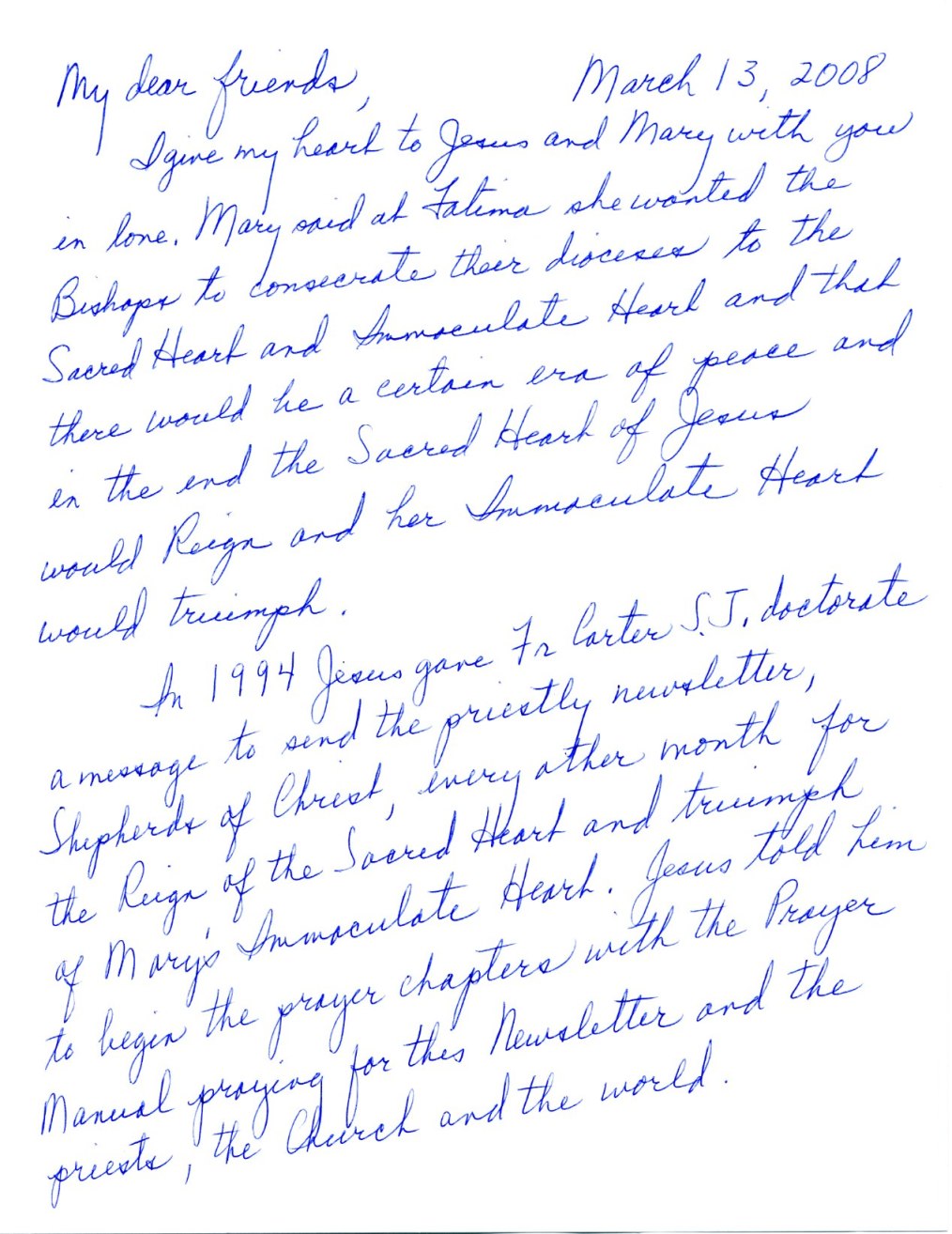
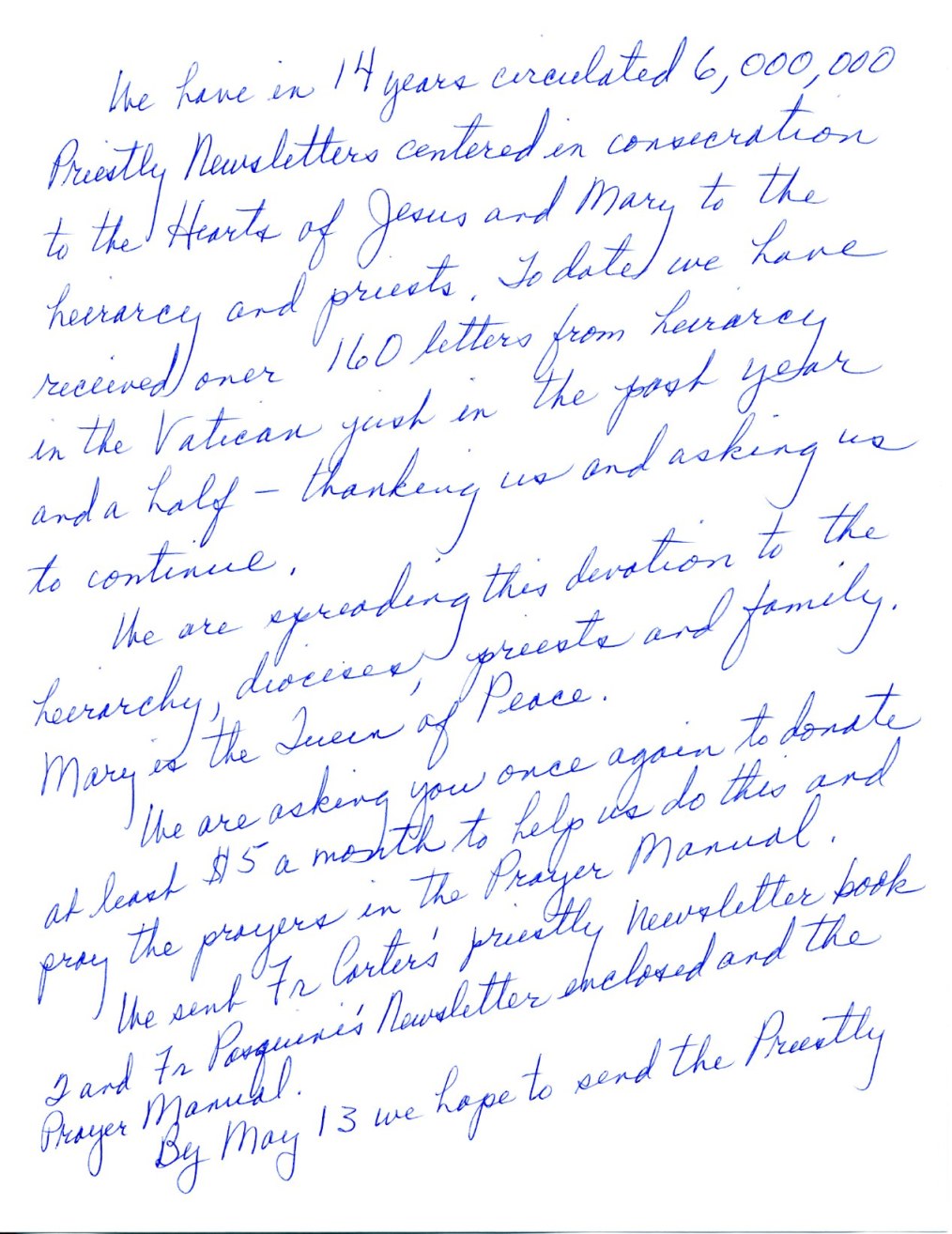
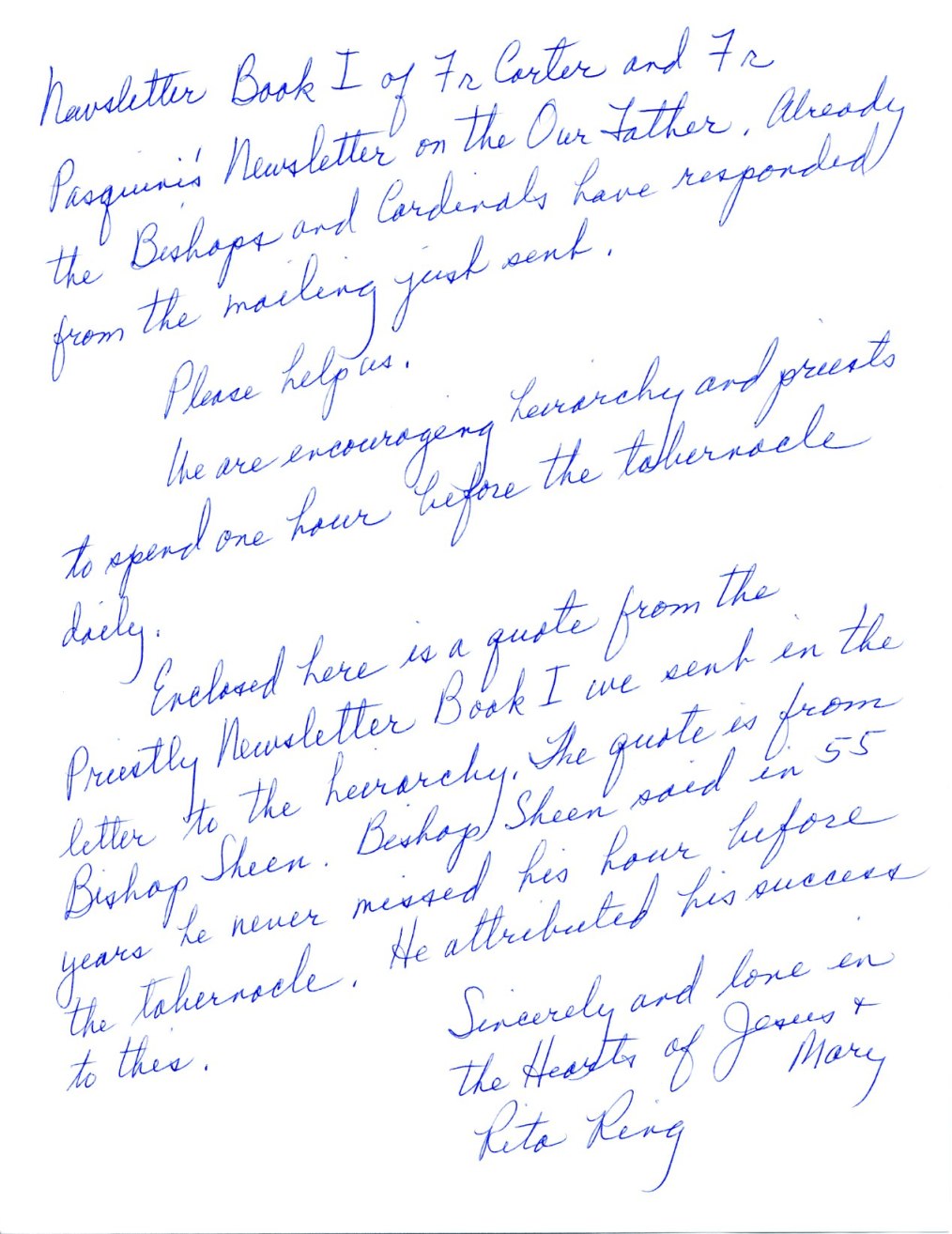
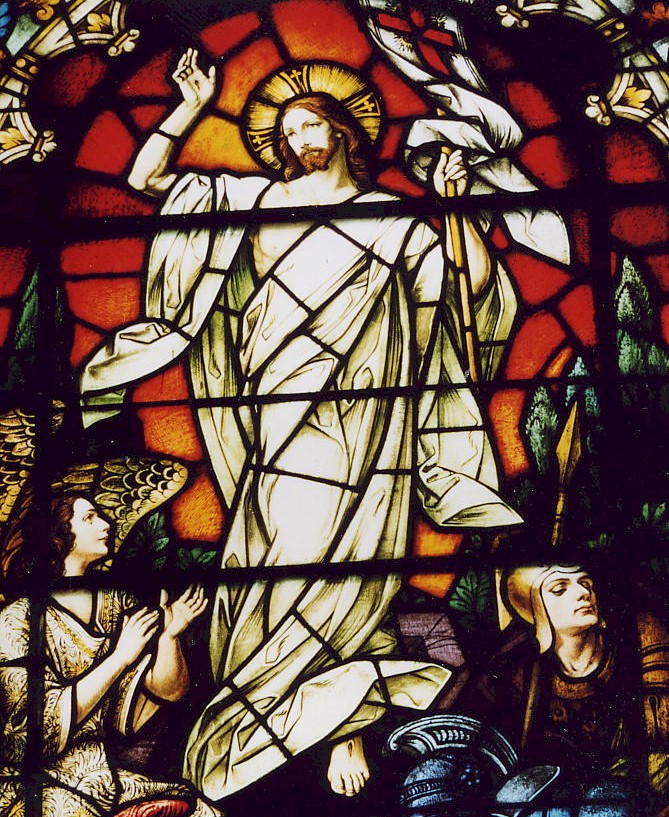
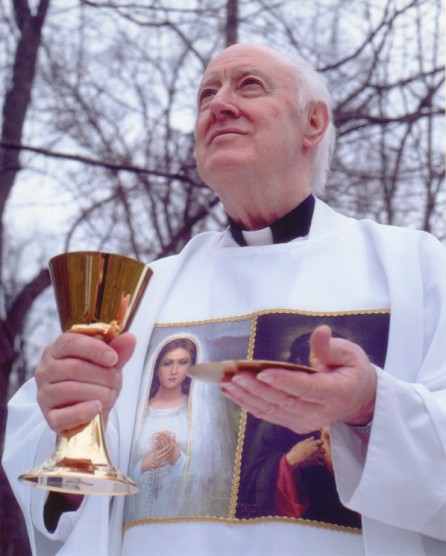

A Spirituality Newsletter for Priests
September/October 1996
"I am the good shepherd: the good shepherd is one who lays down his life for his sheep. The hired man, since he is not the shepherd and the sheep do not belong to him, abandons the sheep and runs away as soon as he sees a wolf coming, and then the wolf attacks and scatters the sheep; this is because he is only a hired man and has no concern for the sheep. I am the good shepherd; I know my own and my own know me, just as the Father knows me and I know the Father; and I lay down my life for my sheep." (Jn 10:11-151)
He hung upon a cross on a hill called Calvary. Death was near. How much Jesus had already suffered! He had been brutally scourged. Much of His sacred body was a bloody, open wound. He had been derisively crowned with thorns. In a terribly weakened condition, He carried the heavy cross to the hill of Golgotha. There He was stripped of His garments and mercilessly nailed to the cross.
Truly the Good Shepherd had laid down His life for His sheep. That magnificent Heart, overflowing with love for His Father and all of us, had beat its last.
Jesus' life was a life of love. He mightily loved His Father and all of us. The poverty, the hiddenness, the disappointments, the accomplishments, the weariness, the joy and the happiness, the pain and the agony-all that constituted the earthly life of the Incarnate Son of the Father, was experienced within the framework of love. Jesus, Who is divine and human, was the great man that He was as He walked this earth because He loved tremendously. He loved in everything He did-tenderly, manfully, with understanding and sympathy. He loved with complete devotedness and a deep concern for the individual. He loved with a passion for that which was true and beautiful and good. He loved with a complete conformity to the Father's Will. He loved always and completely. He loved with the gift of Himself, always pouring Himself out, even to the point of death. He gave Himself in love to His Father and to us until there was no more to give. This was the poignant beauty of Christ's life. He was a giant of greatness because He was one Who loved tremendously.
We can be tempted to reject this marvelous example of Christ. We can seek our greatness and fulfillment in a manner that necessarily results in disappointment. We can strive after greatness in ways that God does not intend. These wayward wanderings, however, result in a feeling of dissatisfaction and frustration. If we follow these false leads, we will eventually come to realize that they have betrayed us. Indeed, these wayward wanderings possess the potential for nothing but betrayal, because they are not rooted in Christ and His way of life-which is the way to true greatness.
We must incessantly remind ourselves of the example that Jesus has given us. We must deepen our realization that our fundamental greatness consists in what we are, and we are to the extent we love God and others. St. Paul, in his own inimitable way, tells us of this: "If I had all the eloquence of men or of angels, but speak without love, I am simply a gong booming or a cymbal clashing. If I have the gift of prophecy, understanding all the mysteries there are, and knowing everything, and if I have faith in all its fullness, to move mountains, but without love, then I am nothing at all. If I give away all that I possess, piece by piece, and if I even let them take my body to burn it, but am without love, it will do me no good whatever." (1 Cor 13: 1-3)
Our greatness, then, lies in our relating in love to both God and others-yes, even to that vast majority whom we will never see or know directly, but whom our love can nevertheless reach out and touch because of our union with Christ. With Christ, there are no space barriers, and, therefore, uniting our love to His can unite us to people the world over.
We grow as Christians through a life that is centered in love within the milieu of the human condition. This is the only framework we have for achieving our greatness, our true personhood, and, consequently, we must not shirk the human condition. Jesus did not shirk it, but rather accepted it and manifested His greatness within it, despite the pain and agony that the human condition at times heaped upon Him. It is true that Jesus rejoiced during the course of His life because of the goodness, sincerity, and response of some of those with whom He dealt. The love that Mary and Joseph showered on Jesus, for instance, gave Him great joy. During His life, however, Jesus often suffered because of the evil side of others-their pettiness, cowardice, insensitivity, selfishness, egotism. In other words, Jesus suffered at the hands of others because they were not what they should have been. However, these experiences did not thwart the greatness of Jesus. He was always what He should have been. Jesus was always the tremendous lover, and He loved even at those times when it was very painful to do so.
Our own greatness in Christ, our growth as Christians, can develop smoothly and joyfully because we, in a special way, experience the goodness and love within the hearts of others, and this makes it easy for us to love as we should. Sometimes, however, the less wholesome side of others crowds in upon us, and we find it difficult to go on loving as we should. In the same way that Christ suffered because of others, we, too, as we try to love, suffer because of others. We suffer because others do not always understand us-this can be true even of those who dearly love us. We suffer because some do not appreciate what we do for them, and sometimes what we do exacts great personal cost. We suffer because others either reject us or make us the objects of their meanness and selfishness. We suffer because there are some who ignore us. At times we suffer so much that we are tempted to withdraw from the pain of giving ourselves in love into an egotistic enclosure of self-seeking, where, we think, we will no longer suffer at the hands of others, or at least will not suffer so much. To surrender to such a temptation, however, is to forget what Christian greatness really is, namely, a life of love for God and others, a love that does not shrink from the pain that results from loving in an imperfect world, a love that is meant to become greater and more selfless regardless of the way other might treat us. Love, then, accepts both the joy and the pain of life and carries on under both conditions. Yes, we are made for love.
The first letter of John tells us: "God is love and anyone who lives in love lives in God, and God lives in him. Love will come to its perfection in us when we can face the day of judgment without fear; because even in this world we have become as he is.
"In love there can be no fear, but fear is driven out by perfect love: because to fear is to expect punishment, and anyone who is afraid is still imperfect in love."We are to love, then, because he loved us first. Anyone who says, 'I love God,' and hates his brother, is a liar, since a man who does not love the brother that he can see, cannot love God, whom he has never seen.
"So this is the commandment that he has given us, that anyone who loves God must also love his brother." (1 Jn 4:16-21)
~ The more love matures, the more it concentrates on the present. Love welcomes each day with a fresh joy and a renewed gratitude to God for the opportunity to once again be and become for Him and others. Love realizes that it does not fully possess the past or the future-it can only fully grasp the present, and it loathes to waste any of the preciousness which "the now" offers.
~ Love is gentle, love is tender. Love is sensitive to the gentleness in nature. It is moved by the softness of the freshly fallen snow, the coolness of an autumn breeze tenderly stroking the brow, and the softness of the grass in May-time greenness. Much more important, love is sensitive to the need for gentleness, for tenderness, in human affairs. Consequently, love gently comforts the grief-stricken parents of a child so tragically and suddenly snatched away in death. Love gently encourages those to whom life seems hopeless. Love sensitively tends to the needs of those who are so often and so easily forgotten. Yes, the gentleness of love manifests itself in these and in many other ways, and, in so doing, imitates the gentleness, the tenderness of Jesus Himself: "Jerusalem, Jerusalem, you that kill the prophets and stone those who are sent to you! How often have I longed to gather your children, as a hen gathers her chicks under her wings, and you refused!" (Mat 23:37)
~ The fact that love is gentle does not mean that it is not strong. It is precisely this, and the blend between its tenderness and its strength constitutes one of love's most attractive traits. Love is strong in many ways. It is not discouraged by the evil in the world that threatens to thwart the accomplishments of love's goals. It realizes that the strength of goodness is mightier than the force of evil and that ultimately love wins out. Love is also strong in bearing with the temporary failures that are experienced in the pursuit of its purpose. Although love may be disappointed, it nevertheless realizes that the only failure it cannot conquer would be love's refusal-love's failure to go on loving-and true love will never quit. Love is strong in its willingness to take the necessary means to achieve its goals, even though this might entail great personal cost or cause misunderstanding, or even cause pain to those who are the recipients of this love.
~ Love is secure. A person who properly loves is in touch with one's true self and realizes that he or she is tremendously loved by God. Such a person feels secure in the exercise of love towards others. He or she feels secure enough to extend love towards others in various ways, even when little or no love is returned.
~ Closely allied to love's feeling secure is love's intuition in realizing the evils of possessiveness. Love does not try to possess the person one loves, but leaves the other free. In fact, authentic love for the other makes the other more free and helps the other to grow in all ways, including growth along the paths of real freedom. The one who loves authentically leaves the other free to grow in all sorts of ways, for example, to relate to other people and to undertake new things, activities which might well make the loved one less accessible.
~ Love is reconciliatory and integrative. Loves hates divisiveness. It knows the difference between diversity and divisiveness. It knows that healthy diversity reflects the varied richness of human existence and is something to be desired. It knows, too, that divisiveness is the sworn enemy of community. Divisiveness perniciously eats away at those bonds of love and union that are meant to unite the members of God's human family. Love, consequently, works to promote the integrative process which unites us and human events according to God's holistic plan, a plan in which the numerous and richly diversified parts become increasingly beautiful the more they contribute to the health and functioning of the whole.
~ Love is trusting. Regarding a person's relationship with God, this attitude grows in proportion to the atmosphere of love. As one grows in the realization of how much God loves him or her, and responds with a love of his or her own, trust in God matures and is a dominant facet of one's daily existence. A serenity of spirit becomes more obvious as the person grows in the awareness of both how much God cares and how supportive His loving embrace is, come what may.
This attitude of trust also characterizes one's relationships with others. One who is exercising true love is not naive or oblivious to the fact that one can be needlessly hurt by this: that one's trust can be betrayed. On the contrary, one who loves realizes that there is certainly an evil side to human nature, but, nevertheless, prefers to concentrate on the basic goodness of the human heart. This positive focus allows a person to trust that people not only will frequently act according to this goodness, but, as a matter of fact, will actually be encouraged to do so when they themselves are the recipients of a true and sincere love.
~ Love is affirming. By the very fact that one loves another, the other is encouraged to be and to become according to his or her uniqueness. Being loved enhances a person's sense of worthwhileness. A person who is loved is encouraged to develop his or her uniqueness, to feel more at home with oneself, and to accomplish further the special mission in life that only he or she can fulfill.
~ Love is patient. Love realizes that, for the most part, the growth of God's kingdom occurs at a very gradual pace. Sometimes this growth process seems exceedingly slow, and a person is tempted to wonder if the efforts of love are actually producing any effects. Patience conquers this temptation, however, and enables love's work to continue. Patience consequently helps prevent the waste of talent in the work of the kingdom. It seems that certain talented people have never realized their potential in promoting Christ's cause precisely because they were not patient enough with others and themselves. Patience is a virtue that is not much discussed, but is nevertheless extremely necessary.
~ Love is not proud, is not egotistical. Love is interested, of course, in the self and the good of the self. One who loves authentically, however, realizes that the love of one's true self is based on the awareness that one has been created and redeemed by God's love, that one has been endowed with various gifts by the Creator, and that these gifts are to be exercised in the loving service of God and others. Love, then, does not become selfishly proud in its accomplishments. Rather, love realizes that God is the ultimate source of personal accomplishments, that one can achieve only what God helps a person to accomplish. Love is very much aware of Jesus' words that without Him we can do nothing.
~ Love is both universal and specific. Love is universal in that it excludes no one. For example, love includes all members of the human family in its prayer. Love is very much aware, however, that one can say he or she loves everybody, but be sadly lacking when it comes to manifesting love in various ways according to the concrete setting of every day. True love, then, does not shy away from the painful aspects of loving specific individuals in definite, concrete circumstances. Admittedly, such a service of love can be difficult, demanding, and unattractive in certain ways. Personality flaws in others, or particular personalities that are not attractive to the one who is trying to be of help, or indifference, or even hostility on the part of those one strives to serve-these and other realities are a true test of a person's willingness to concretely implement one's avowal that one does indeed love his or her neighbor as the Lord commands, even when it is difficult to do so.
~ The Christian's fundamental relationship is his or her union with God in Christ. The more one realizes how much God loves him or her as this unique individual, and the more the person responds to this love, the greater the happiness. If this basic love relationship with God in Christ is alive and healthy, everything else in life falls into place. There may be problems, at times very severe problems. There may be great suffering. But all of this becomes bearable for the one who feels reasonably secure in God's love. A poll has been taken which finds that unhappiness is about five times greater among non-religious people than among people who would be classified as being very religious.
The saints' progress in holiness was accompanied by their conviction that God loved them mightily. We also have to allow the realization of how much God loves us to accomplish our ongoing transformation in Christ. Since it's true that God loves each of us so uniquely, so intimately, why don't we take greater effort to arrive at the existential assent to this consoling truth? By an existential assent we mean one which reaches deep down, an assent which permeates our being so thoroughly that it erases and makes repugnant the thought of compromising for a life of spiritual mediocrity. At times we foolishly shy away from God's love. We foolishly think that to give ourselves ever more to this love, to allow it to possess us more radically, will mean that our lives will be too much hemmed in, too much cut off from the pursuit of our self-designed ideas of happiness. If we succumb to such a temptation, we become similar to the prodigal son who thought happiness existed elsewhere than in his father's house. His pursuit of this false happiness ultimately ended up in his willingness to eat the food given to pigs. We ourselves are not totally blameless. To the extent we refuse to be more possessed by God's love, and choose to be directed by it, to that degree we also are willing to settle for food which is unworthy, food which can never satisfy our true cravings.
~ Love is contemplative. It realizes it must sustain and develop a contemplative awareness of reality if it is to love properly. To relate in love to reality as we should means that first we must view reality according to its true nature, that is, we must see things according to our faith vision. Jesus has left us with the proper view of God and creation. Jesus has told us how to relate to God and His creation, how to love. This faith vision must be consistently actualized through a contemplative or prayerful awareness of the people, events, and circumstances that are part of our daily lives. If we fail, for example, to see people as they really are in their core existence, namely, as created and redeemed by God's love, and instead allow ourselves to be absorbed by more superficial aspects of their persons, then we will not love them as we should.
Love seeks, therefore, a certain degree of solitude in order to nourish this contemplative attitude. A person cannot hope to exercise a contemplative awareness throughout the myriad and often complex happenings of daily existence unless there are periods of withdrawal during which one can drink more deeply of the wisdom which contemplation offers. A person must conquer the temptation that deceitfully suggests that the seeking of solitude is a selfish desire to flee the pain of human encounter. Authentic solitude is never selfish; rather, it is a renewed opportunity for refurbishing both one's contemplative vision and one's determination to love more maturely according to this perspective.
~ Love knows what love really is, and this awareness is a result of love's contemplative thrust. One of the truths that emanates from the act of contemplation is the realization of what actually constitutes true love. This is no small accomplishment, for, despite the numberless volumes that have been written about love, one can still have only a blurred idea of what it really is. Giving love is the gift of self to promote the authentic good of the other loved. Being loved is receiving the other's gift of self as a help in achieving one's real good.
The manner in which the gift of self is made is commensurate with the type of relationship. A doctor gives himself or herself to one's spouse in one way, to one's children in another, to one's patients in yet another way, and to his or her friends in a way that is still further differentiated. Whatever way the gift of self is made, however, it has the same basic goal in mind, namely, to promote the real good of the other. Love realizes that it is not always easy to discern what really promotes the true good of the other. However, despite this difficulty, love is aware of its true identity. Love, in short, knows what love really is.
~ When we experience love-hurt in abundant measure, we can be tempted to think that it may be better not to love at all. But a moment's mature reflection tells us otherwise. We are made for love. We are to love God and human persons. The only way we can grow is to love. Despite the pain, we have to love if we want to grow, if we want to be happy, if we want to be what God destines us to be. At times, and especially when the love-pain is particularly keen, we should look at the example Jesus has left us. He came upon the earth to love. He did not flinch, He did not renege. He did not quit loving when it was painful to do so-even when it became agonizingly painful to do so. This is the poignant beauty of His life.
~ "After saying this, what can we add? With God on our side who can be against us? Since God did not spare His own Son, but gave Him up to benefit us all, we may be certain, after such a gift, that He will not refuse anything He can give. Could anyone accuse those that God has chosen? When God acquits, could anyone condemn? Could Christ Jesus? No! He not only died for us-He rose from the dead, and there at God's right hand He stands and pleads for us.
"Nothing therefore can come between us and the love of Christ, even if we are troubled or worried, or being persecuted, or lacking food or clothes, or being threatened or even attacked'
"For I am certain of this: neither death nor life, no angel, no prince, nothing that exists, nothing still to come, not any power, or height or depth, nor any created thing, can ever come between us and the love of God made visible in Christ Jesus Our Lord." (Rom 8:31-39)
From the spiritual classic, The Imitation of Christ, we read: "Make room for Christ. When you possess Christ you are a rich man, for he is sufficient for you. He himself shall provide for you and faithfully administer all your cares. You will not have to place your hope in man. Put all your trust in God, let him be both your fear and your love. He will respond on your behalf and will do whatever is in your best interest.
"You have here no lasting city. For wherever you find yourself, you will always be a pilgrim from another city. Until you are united intimately with Christ, you will never find your true rest.
"Let your thoughts be with the Most High and direct your prayers continually to Christ. If you do not know how to contemplate the glory of heaven, take comfort in the passion of Christ, and dwell willingly in his sacred wounds. Endure with Christ, suffer for him, if you wish to reign with him.
"Once you have entered completely into the depths of Jesus, and have a taste of powerful love, then you will not care about your own convenience or inconvenience. Rather, you will rejoice all the more in insults and injuries, for the love of Jesus makes a man scorn his own needs."2
Fr. Paul de Jaeger, S.J., writes: "Why do we not once and for all spread wide the sails of the ship of our trust? Did we but do this, how utterly our lives would be changed! How this would enable us to ride before the wind, to ride fast towards the greatly desired anchorage of perfect union with Jesus! Only when she had made strong her trust did St. Teresa of the Child Jesus, trust's great Saint, set out to walk the ways of divine love. From that day on her life was changed. Is that not our need also? Would that for us too this change could be made without delay, could be made this very day! Would that, making a supreme effort to respond to the full to the infinite goodness of Jesus in the Eucharist, we could bid a final farewell to all our cowardice, to all our vain fears, to all things conducive of faulty trust'"3
Fr. Peter van Breeman, S.J., observes: "The matter of joy in the risen Lord has a great deal to do with faith, for a sad Christian is really not an authentic Christian. In this regard the words of Mother Teresa of Calcutta are impressive. She has devoted her life to the lowest form of human misery; her days are wholly taken up with the sufferings and the sorrows of the most forsaken. And, yet, her words are unqualified: 'Never let anything fill your heart with so much grief that you forget the joys of the risen Lord.' These are the words of a woman of faith'Mother Teresa can work with the poor because she has Christ's own intense joy and gladness in her heart. It is this which makes her so radiant, so appealing. For this reason people flock to her, and she is able to console them truly, not just with money or medication-she has too little of these-but above all with the true consolation that comes from faith, the faith embodied in her own life."4
The Catechism states: "By calling God 'Father,' the language of faith indicates two main things: that God is the first origin of everything and transcendent authority; and that He is at the same time goodness and loving care for all His children. God's parental tenderness can also be expressed by the image of motherhood, which emphasizes God's imminence, the intimacy between Creator and creature. The language of faith thus draws on the human experience of parents, who are in a way the first representatives of God for man. But this experience also tells us that human parents are fallible and can disfigure the face of fatherhood and motherhood. We ought therefore to recall that God transcends the human distinction between the sexes. He is neither man nor woman: He is God. He also transcends human fatherhood and motherhood, although He is their origin and standard: no one is father as God is Father."5
The Catechism succinctly explains the role of the Holy Spirit in our lives: "Jesus is Christ, 'anointed,' because the Spirit is his anointing, and everything that occurs from the Incarnation on derives from this fullness. When Christ is finally glorified, He can in turn send the Spirit from his place with the Father to those who believe in him: he communicates to them his glory, that is, the Holy Spirit who glorifies him. From that time on, this joint mission will be manifested in the children adopted by the Father in the Body of his Son: the mission of the Spirit of adoption is to unite them to Christ and make them live in him."6
Rita Ring writes: "Mary is always desiring to bring forth her children to a greater Christ likeness. It is through Mary that we join in deepest intimacy with Jesus' Heart. Jesus came into this world in the womb of His Mother through the power of the Holy Spirit. It is today, in the womb of Mary, in the heart of Mary, that we are transformed through the Holy Spirit more and more to the likeness of Jesus. Let us go to the heart of our Mother and ask the Holy Spirit to increasingly sanctify us that we may go ever more deeply into the Heart of Jesus, the Heart of endless love. We do not fully comprehend the love of God. We are so limited in our vision. We do not fully know how Jesus' Heart is truly burning and on fire. Do we know what it is to feel love burning in our heart? This is what Jesus felt when He allowed Himself to suffer during His Passion and to die on the cross. His Heart was on fire."7
St. Thomas Aquinas has left us these inspirational words on the Eucharist, the source and summit of the Christian life: "Since it was the will of God's only begotten Son that men should share in his divinity, he assumed our nature in order that by becoming man he might make men gods. Moreover, when he took our flesh he dedicated the whole of its substance to our salvation. He shed his blood for our ransom and purification, so that we might be redeemed from our wretched state of bondage and cleansed from all sin. But to ensure that the memory of so great a gift would abide with us forever, he left his body as food and his blood as drink for the faithful to consume in the form of bread and wine.
"O precious and wonderful banquet, that brings us salvation and contains all sweetness! Could anything be of more intrinsic value. Under the old law it was the flesh of calves and goats that was offered, but here Christ himself, the true God, is set before us as our food. What could be more wonderful than this? No other sacrament has greater healing power; through it sins are purged away, virtues are increased, and the soul is enriched with an abundance of every spiritual gift. It is offered in the Church for the living and the dead, so that what was instituted for the salvation of all may be for the benefit of all. Yet, in the end, no one can fully express the sweetness of this sacrament, in which the spiritual delight is tasted at its very source, and in which we renew the memory of that surpassing love for us which Christ revealed in his passion.
"It was to impress the vastness of this love more firmly upon the hearts of the faithful that our Lord instituted this sacrament at the Last Supper. As he was on the point of leaving the world to go to the Father, after celebrating the Passover with his disciples, he left it as a perpetual memorial of his passion. It was the fulfillment of ancient figures and the greatest of all miracles, while for those who were to experience the sorrow of his departure, it was destined to be a unique and abiding consolation."8
Pope John Paul II on the Priesthood
Pope John Paul II speaks on the relationship of the hierarchical priesthood and the common priesthood of the faithful: "We must consider down to the smallest detail not only the theoretical meaning but also the existential meaning of the mutual 'relation' that exists between the hierarchical priesthood and the common priesthood of the faithful. The fact that they differ not only in degree but also in essence is a fruit of a particular aspect of the richness of the very priesthood of Christ which is the one center and the one source, both of that participation which belongs to all the baptized and of that other participation which is reached through a distinct sacrament, which is precisely the sacrament of Orders. This sacrament, dear brothers, which is specific for us, which is the fruit of the special grace of vocation and the basis of our identity, by virtue of its very nature and of everything that it produces in our life and activity, serves to make the faithful aware of their common priesthood and to activate it: the sacrament reminds them that they are the People of God and enables them 'to offer spiritual sacrifices' through which Christ Himself makes us an everlasting gift to the Father. This takes place, above all, when the priest 'by the sacred power that he has'in the person of Christ (in persona Christi) effects the Eucharistic Sacrifice and offers to God in the name of all the people,' as we read in the conciliary text quoted above.
"Our sacramental priesthood, therefore, is a 'hierarchical' and at the same time 'ministerial' priesthood. It constitutes a special ministerium, that is to say, 'source,' in relation to the community of believers. It does not, however, take its origin from that community, as though it were the community that 'called' or 'delegated'. The sacramental priesthood is truly a gift for the community and comes from Christ Himself, from the fullness of His priesthood. This fullness finds its expression in the fact that Christ, while making everyone capable of offering the spiritual sacrifice, calls some and enables them to be ministers of his own sacramental Sacrifice, at the Eucharist-in the offering of which all the faithful share-in which are taken up all the spiritual sacrifices of the People of God.
"Conscious of this reality, we understand how our priesthood is 'hierarchical', that is to say, connected with the power of forming and governing the priestly people and precisely for this reason 'ministerial.' We carry out this office, through which Christ Himself unceasingly 'serves' the Father in the work of our salvation. Our whole priestly existence is and must be deeply involved with this service, if we wish to effect in an adequate way the Eucharistic Sacrifice in persona Christi.
"This priesthood calls for a particular integrity of life and service, and precisely such integrity is supremely fitting for our priestly identity. In that identity, there are expressed, at the same time, the greatness of our dignity and the 'availability' proportionate to it. It is a question of the humble readiness to accept the gifts of the Holy Spirit and to transmit to others the fruits of love and peace, to give them that certainty of faith from which derive the profound understanding of the meaning of human existence and the capacity to introduce the moral order into the life of individuals and of the human setting.
"Since the priesthood is given so that we can unceasingly serve others, after the example of Christ, the Lord, the priesthood cannot be renounced because of the difficulties that we meet and the sacrifices asked of us. Like the apostles, we have left everything to follow Christ: therefore we must persevere beside Him also through the cross."9
Thomas Merton speaks to us about the place of love in prayer: "The instinctive characteristic of religious meditation is that it is a search for truth which springs from love and which seeks to pursue the truth not only by knowledge but also by love. It is, therefore, an intellectual activity which is inseparable from an intense consecration of spirit and application of the will. The presence of love in our meditation intensifies our thought by giving it a deeply affective quality. Our meditation becomes charged with a loving appreciation of the value hidden in the supreme truth which the intelligence is seeking. The affective drive of the will'raises the soul above the level of speculation and makes our quest for truth a prayer full of reverential love and adoration striving to pierce the dark cloud which stands between us and the throne of God. We beat against this cloud with supplications, we lament our poverty, our helplessness, we adore the mercy of God and His supreme perfections, we dedicate ourselves entirely to His worship."10
Lord Jesus, Chief Shepherd of the Flock, I consecrate my priestly life to your Heart, pierced on Calvary for love of us. From your pierced Heart the Church was born, the Church you have called me, as a priest to serve in a most special way. You reveal Your Heart as symbol of Your love in all its aspects, including Your most special love for me, whom You have chosen as Your priest-companion. Help me always to pour out my life in love of God and neighbor. Heart of Jesus, I place my trust in you!
Dear Blessed Virgin Mary, I consecrate myself to your maternal and Immaculate heart, this Heart which is symbol of your life of love. You are the Mother of my Savior and you are also my Mother. You love me with the most special love as this unique priest-son. In a return of love I give myself entirely to your motherly love and protection. You followed Jesus perfectly. You are His first and perfect disciple. Teach me to imitate you in the putting on of Christ. Be my motherly intercessor so that, through your Immaculate Heart, I may be guided to an ever closer union with the pierced Heart of Jesus, Chief Shepherd of the Flock, who leads me to the Father in the Holy Spirit.
We thank all those who have taken the time to write to us. We very much appreciate your letters. Space limitations permit us to publish only a few of these.
Dear Fr. Carter,
Deo Gratias and also to you for your Shepherds of Christ newsletter-a gem. Your articles always have solid meditation material and an inviting way of leading us priests on that path of holiness to which we are called.
May your work be graced by the Lord.Sincerely in Jesus and Mary,
Fr. Eugene Golas,
Grand Rapids, Michigan
My dear Fr. Carter:
Many thanks for the March-April issue of Shepherds of Christ. That is the first issue I ever saw or received. May the good Lord bless you. It is a wonderful newsletter. I am enclosing a small donation. May God love you.Sincerely,
Fr. Charles Jirik,
Minneapolis MN
Note: If you know of other priests who have not been receiving the Newsletter, please tell them we would be very glad to add them to our mailing list upon receiving their names and addresses.
—Editor
Dear Ed,
I recently ran across your publication. As a newly ordained priest, I found it most refreshing and affirming. Please subscribe me at the above address. We are all grateful to people like you who help people like us.Gratefully,
Fr. John Kennedy,
Monroe, Louisiana
Scriptural quotations are taken from The Jerusalem Bible, Doubleday & Co.
"The Imitation of Christ," as in The Liturgy of the Hours, Catholic Book Publishing Company, Volume II, pp. 527-528.
Fr. Paul de Jaeger, S.J., The Virtue of Trust, P.J. Kenedy & Sons, p. 59.
Fr. Peter van Breeman, S.J., Called By Name, Dimension Books, pp. 201-202.
The Catechism of the Catholic Church, No. 239.
Ibid., No. 690.
Rita Ring, Rosaries from the Hearts of Jesus and Mary, to be published by Shepherds of Christ Publications.
St. Thomas Aquinas, as in The Liturgy of the Hours, op. cit., Volume II, p. 611.
Pope John Paul II, "To All the Priests of the Church on the Occasion of Holy Thursday, 1979," as in Set Apart for Service, St. Paul Editions, pp. 85-87.
Thomas Merton, A Thomas Merton Reader, Thomas P. McDonnell, editor, Doubleday, p. 325.
end of Sept/Oct 1996 Priestly Newsletter
God’s Blue Books
 |
God’s Blue Book 1 – Messages given by Jesus to Rita Ring. Jesus tells us how precious we are to Him and how He loves us. He is with us this day, so close. He is a person who longs and waits for our love. He wants such union with us. These are His teachings to lift you up! Tapes are available with messages and songs given from Jesus. |
 |
God’s Blue Book 2 – Messages given by Jesus to Rita Ring. Jesus is on fire for us. Rita saw a vision of Jesus’ Heart on Dec. 17, 1991. The power is in the Eucharist. The power is released when hearts are consecrated to the Hearts of Jesus and Mary. Jesus wants His beloved souls to pray before the tabernacle and after Communion. It is in praying to Him at these times that we become very close to Him. His Heart is an endless furnace of burning love on fire for each of his precious souls. He wants union with us. Only in the surrendering of ourselves to the will of God can we be close to Him. Tapes are available with messages and songs given from Jesus. |
 |
God’s Blue Book 3 – Messages given by Jesus to Rita Ring. Love God, love one another. He is the Way, the Truth, and the Life. How can we say that we love Him when we do not love one another? Each person was created by the Father. If we do not love our brother, we are not loving His creation. We are the lights that shine in this world. Jesus loves us so much, He gives Himself to us in the Eucharist. He remains with us in the tabernacle, and we take His gift so lightly. In this book, He tells us about His immense love. He asks us to rid ourselves of hate and anger and to love our brothers. He talks about Mary. Two rosaries are included. |
 |
God’s Blue Book 4 – Messages from Jesus and Mary. How they love us! Mary appeared to me everyday and I knew from these writings more about Jesus’ love for Mary and Mary’s love for Jesus and Their love for us. This book is a beautiful message from the Two Hearts and it includes rosary mediations from Mary and Jesus. This book really talks about Their pure love and how we can love more purely. |
 |
God’s Blue Book 5 – Jesus wants to be so united with us. He is the bridegroom of our soul. In living deeper consecration to the Two Hearts we can love more purely. This is a book about pure love. It is awesome. It has many rosaries from the Hearts of Jesus and Mary. Some writings are also from Fr. Carter. |
 |
God’s Blue Book 6 – Jesus and
Mary appeared everyday giving these rosaries. We can receive tremendous
grace when we pray them with a candle. Some writings are also from Fr.
Carter. This will help you grow in the spiritual life when you pray
these rosaries. He Calls Us to Action – This book is a call to action. He gives us His love and He sends us into the world to spread this love to others. We cannot hold back. We need to pray to the Holy Spirit to enlighten us and to give us His courage to carry out the plan of the Father. Holy Spirit transform us from fear to fearlessness. He is one in us. Minute-by-minute, second-by-second, He provides for our needs. Hear His soft voice all through the day say, I love you, I love you, I love you. |
|
Shepherds of Christ Quantity Total Blue Book I $10.00 ______ __________ Blue Book II $10.00 ______ __________ Blue Book III $10.00 ______ __________ Blue Book 4 $5.00 ______ __________ Blue Book 5 $5.00 ______ __________ Blue Book 6 $10.00 ______ __________ Total __________________ Postage ($2.00 per book) __________________ Grand Total __________________ Name ________________________________________________________ Address _____________________________________________________ _______________________________________________________________ |
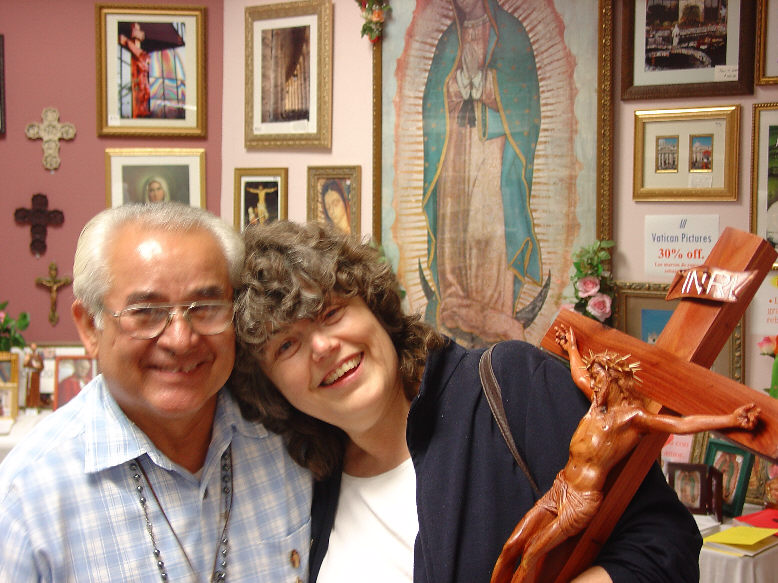
Available for $750.00
Fatima/Clearwater Glass Statues available.Call or go to China
1-888-211-3041
6015 N. State Rd 62
China, IN 47250
or call Clearwater
21649 US 19 N
Clearwater, FL 337651-888-321-7671
1-727-725-9312
Brand New Internet Store